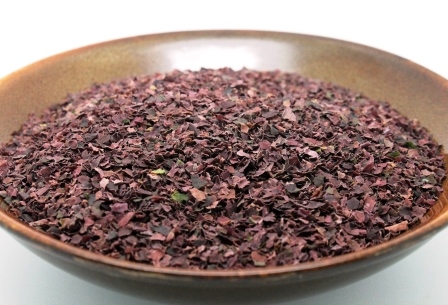What is dulse flakes?
 Dulse or Palmaria Palmata is a type of marine seaweed. It is purple in color, soft in texture and has a mild flavor. Dulse is known to have the highest Iron content in all sea vegetables, containing nearly 25 times the iron found in spinach and 7 times that found in liver. This wonderful seaweed is very easy to prepare. You can cut it with scissors and fry it like bacon to make it crispy. Dulse flakes can be used in place of salt and added to soups, salads, or curries. Many Asian cultures have been aware of the numerous dulse health benefits and origins of eating it can be traced back to nearly 1200 years ago. Like all sea vegetables, Dulse is low in fats and calories but rich in essential fatty acids, minerals and proteins.
Dulse or Palmaria Palmata is a type of marine seaweed. It is purple in color, soft in texture and has a mild flavor. Dulse is known to have the highest Iron content in all sea vegetables, containing nearly 25 times the iron found in spinach and 7 times that found in liver. This wonderful seaweed is very easy to prepare. You can cut it with scissors and fry it like bacon to make it crispy. Dulse flakes can be used in place of salt and added to soups, salads, or curries. Many Asian cultures have been aware of the numerous dulse health benefits and origins of eating it can be traced back to nearly 1200 years ago. Like all sea vegetables, Dulse is low in fats and calories but rich in essential fatty acids, minerals and proteins.
Here are the top 5 health benefits of Dulse.
Top 5 Health Benefits of Dulse
1. High in vitamins and minerals
Red seaweed like nori and dulse grows in deeper parts of the ocean where they have little or no exposure to sunlight. Because of this special marine environment, Dulse is very high in Calcium, Iron, Iodine, Copper, and Magnesium. Generally, only animal sources contain Vitamin B12, but Dulse is one of the few plant sources of this important nutrient. This red seaweed is also a rich source of iron: an 8 g serving of dried dulse tested higher in iron than did a 100 g serving of sirloin steak. Dulse also contains 1.2 grams of fiber, 13.8 grams of water, 7.9 grams protein, 0.1g fat, 59.8g of carbohydrates and 9.20 g of minerals (Ca, K, Na, Mg, P, Fe, I) per 100 grams.
2. Anti-tumor and anti-cancer
One of the best-known dulse health benefits is its strong anti-cancer property. According to a 2014 study published in the Journal of Microbiology and Biotechnology, dulse seaweed polyphenols inhibited pancreatic cancer cells and also showed anticancer effects on human glioblastoma cells in vitro. Another 2006 study has shown that red and brown seaweed like dulse were effective free radical scavengers and exhibited dose-dependent inhibition against the growth of human cervical epithelial adenocarcinoma cells.
3. Improved Digestive health
Dulse seaweed is rich in prebiotic complex carbohydrates. These probiotics are resistant to the digestive enzymes so they reach the lower intestines where they undergo selective fermentation by the intestinal bacteria. This has been studied in lab animals and is showing promise as an alternative to antibiotics. Sea vegetables like dulse flakes can also be used in place of salt while cooking legumes like beans. This helps break down hard to digest fibers in these legumes and also adds to the mineral content of the dish.
4. Improved Cardiovascular health
Almost all sea vegetables, dulse included, have the ability to ward off cardiovascular diseases, thanks to their anti-inflammatory and antioxidant properties. The polysaccharides such as alginate, porphyran, ulvan, and funoran found in Dulse are known to reduce cholesterol. However, excess dulse can also have anti-thrombotic effect and may interfere with blood thinning medicines.
5. Obesity, weight loss, and blood sugar control
Seaweed antioxidant fucoxanthin found in Dulse seaweed may help decrease body weight, body fat accumulation and size of adipocytes in mice. A 2012 study has also shown that this antioxidant increases thermogenesis and whole body energy expenditure which has great potential in body weight management. Dulse health benefits also include detoxification as the alginates in this seaweed bind with the heavy metals making it ideal for detox support.
Conclusion – dulse has many health benefits for you
By adding dulse seaweed and/or dulse flakes to your diet, you will experience several health benefits thanks to its vast array of minerals and antioxidants having anti-cancer properties. It can also maintain cardiovascular health, stabilize blood sugar, aid in detox and provide anti-inflammatory and anti-oxidant support.

